Overview
The article outlines ten essential project management techniques that startup founders can utilize to enhance their efficiency and effectiveness. Techniques such as the Critical Path Method (CPM), Scrum, and Lean Project Management are highlighted. Each of these methods offers structured approaches designed to streamline workflows, improve team collaboration, and maximize value. This is crucial for addressing the unique challenges faced by startups.
How can these techniques transform your project outcomes? By implementing these strategies, founders can not only navigate obstacles but also position their ventures for success.
Introduction
Navigating the tumultuous waters of startup management requires more than just a great idea; it demands effective project management techniques that can adapt to rapid changes and unforeseen challenges.
Founders often grapple with the dual pressures of innovation and efficiency. Therefore, implementing strategies that streamline processes while enhancing team collaboration is essential.
As startups strive to thrive in competitive landscapes, a pivotal question emerges: which project management techniques can genuinely drive success and foster growth?
This article delves into ten essential methodologies tailored for startup founders, revealing how they can harness these tools to elevate productivity and adeptly navigate the complexities of project execution.
Casy: Automate Task Management and Enhance Productivity
Casy functions as an invisible project manager, utilizing project management techniques to seamlessly integrate with chat platforms like Slack and Telegram. By automatically capturing key information from discussions, it creates assignments, sets deadlines, and updates documents without requiring manual input. This automation empowers teams to concentrate on their core activities, reducing overhead and enhancing productivity.
Casy's comprehensive project management techniques categorize assignments into areas such as R&D, Bugs, and In Progress, ensuring complete visibility for team members. It also supports project management techniques such as OKRs and the Eisenhower Matrix, enabling efficient prioritization of tasks. Consider this: 85% of business leaders believe that automation allows employees to focus on strategic goals—an advantage directly associated with Casy's automation features. Furthermore, 73% of IT leaders report that automation has minimized time spent on manual tasks, illustrating how Casy amplifies this efficiency.
Case studies reveal that organizations leveraging automation, including those using Casy, experience significant improvements in efficiency and resource allocation. This ultimately leads to enhanced team performance and greater success in their initiatives. Are you ready to elevate your team's productivity with Casy's automation capabilities?
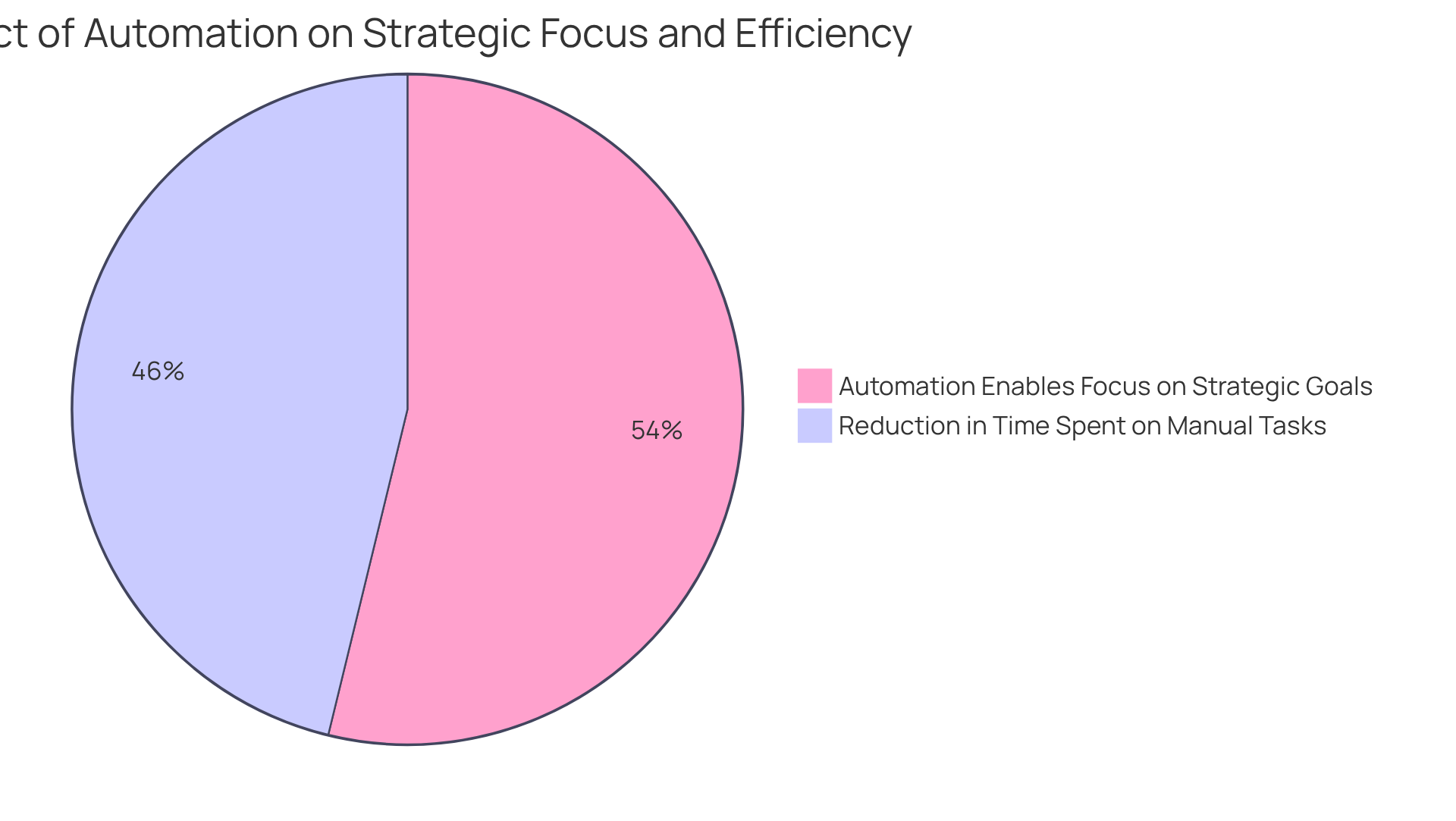
Critical Path Method (CPM): Optimize Project Scheduling
The Critical Path Method (CPM) stands as a pivotal project management technique, pinpointing the longest sequence of dependent activities essential for project completion. By concentrating on these critical tasks, startup founders can significantly enhance their timelines, thereby ensuring effective resource allocation and adherence to deadlines. CPM not only aids in visualizing timelines but also elucidates dependencies, a vital aspect for sustaining momentum and preventing delays.
To elevate project scheduling, startup founders should consider leveraging tools like Casy, which automates the creation of activities and integrates effortlessly with chat platforms such as Slack and Telegram. This integration allows teams to capture vital information from discussions, transforming conversations into actionable tasks without the need for manual input. By tackling prevalent challenges such as administrative burdens and the hassle of manual updates, Casy complements the CPM methodology, empowering teams to concentrate on innovation and productivity.
Consider a case study from a woodworking company that exemplified how efficient scheduling and prioritization of activities led to timely project completion. By employing project management techniques like CPM in conjunction with Casy, startup founders can streamline workflows, minimize coordination costs, and boost overall task efficiency. Furthermore, incorporating built-in methodologies like OKRs can assist teams in effectively prioritizing their efforts, ensuring that critical activities align with broader business objectives.
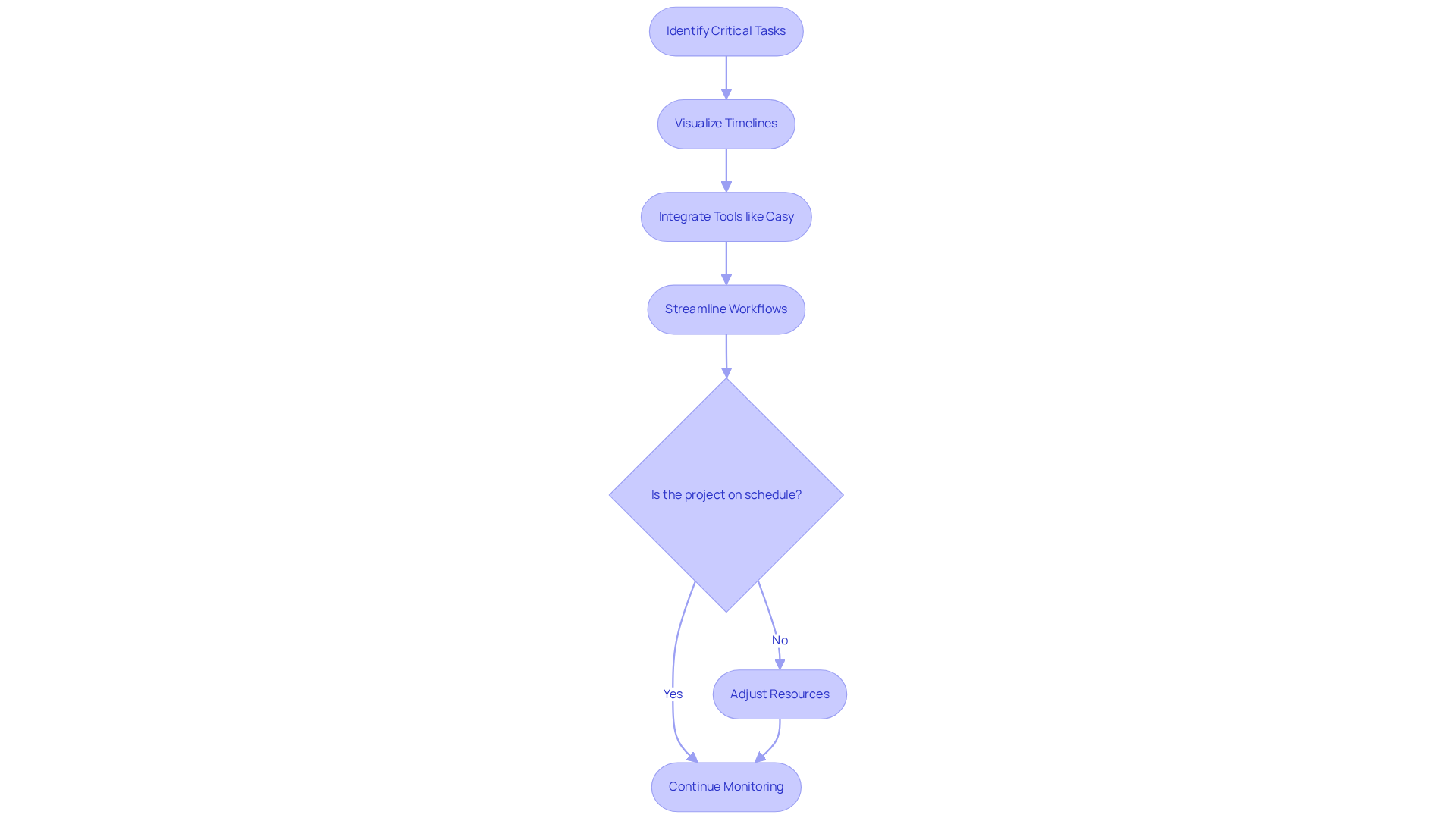
Scrum: Foster Agile Development and Team Collaboration
Scrum stands as a powerful agile framework, facilitating iterative progress through time-boxed cycles known as sprints. It champions collaboration, accountability, and continuous feedback—qualities that are essential for startups striving to adapt swiftly to evolving requirements.
Have you considered how adopting Scrum could transform your team's communication? By implementing this framework, teams can apply project management techniques to prioritize activities with precision and deliver incremental enhancements.
The result? Greater customer satisfaction and a pathway to success. Embrace Scrum to elevate your startup's potential and navigate the complexities of a dynamic market.
Work Breakdown Structure (WBS): Simplify Project Planning
A Work Breakdown Structure (WBS) is a vital framework in project management techniques, effectively dividing a venture into smaller, manageable components. This hierarchical decomposition not only clarifies deliverables and tasks but also facilitates accurate cost estimation, resource allocation, and progress tracking using project management techniques. For startup founders, the implementation of a WBS can significantly mitigate the risk of scope creep—an issue that plagues many endeavors. By clearly defining boundaries and deliverables, WBS enhances overall clarity, ensuring that all critical aspects are comprehensively addressed.
Consider this: startups that have adopted project management techniques, such as WBS methodologies, report improved outcomes, enabling teams to focus on specific tasks while maintaining a clear view of overall objectives. This structured approach is particularly advantageous in dynamic environments where agility is paramount. Furthermore, industry specialists emphasize that efficient project management techniques, such as WBS, contribute to the success of initiatives, with 48% of endeavors globally recognized as successful. By utilizing project management techniques such as WBS, startup founders can navigate the complexities of task management with greater confidence and efficiency. Moreover, with 53% of initiatives overseen by non-certified managers, the structured methodology of WBS becomes even more crucial in enhancing management effectiveness.
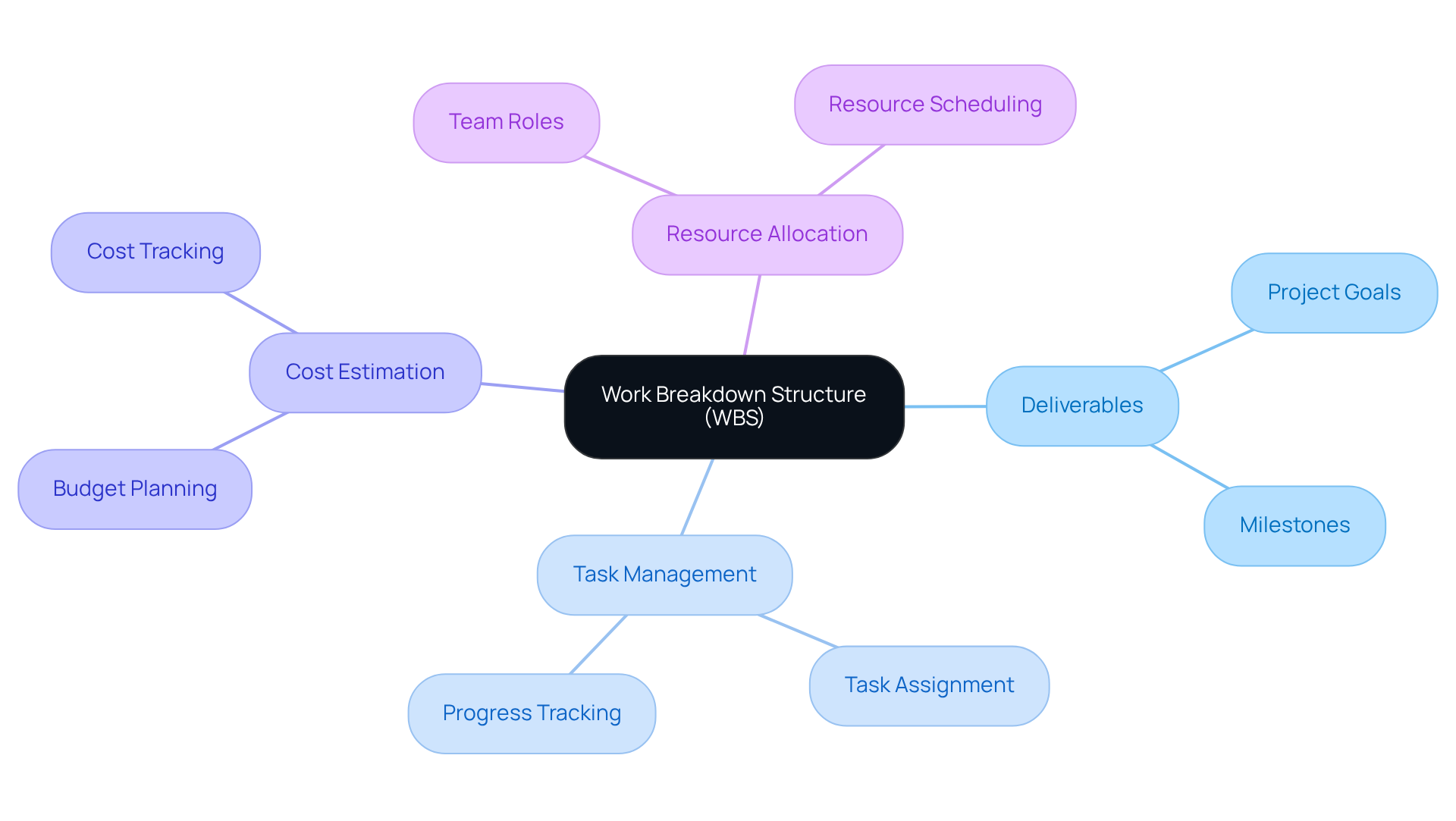
Gantt Charts: Visualize Project Timelines and Milestones
Gantt charts serve as powerful visual depictions of schedules, illustrating activities along a timeline. They empower managers and teams to visualize task durations, dependencies, and milestones, thereby facilitating progress tracking and the identification of potential delays. For startup creators, Gantt charts provide a clear overview of timelines, enhancing planning and communication with team members and stakeholders. Notably, groups employing task coordination techniques report a remarkable 92% success rate in achieving their goals, underscoring the importance of organized tools like Gantt charts.
Moreover, 77% of top-performing initiatives utilize management software, highlighting the efficiency of visual tools in driving results. However, managers often face challenges, with 44% acknowledging that a lack of resources is a significant issue. By leveraging Gantt charts, startups can effectively tackle these hurdles, ensuring that all team members are aligned and cognizant of deadlines. This visual approach not only sustains attention but also fosters teamwork, as it enables every participant to comprehend how their contributions fit within the larger framework.
Real-world applications of Gantt charts in startups demonstrate their capacity as project management techniques to significantly enhance project outcomes. By providing clarity and structure, Gantt charts ultimately improve project management techniques, leading to more successful project completions. Are you ready to elevate your project management strategy and achieve greater success?
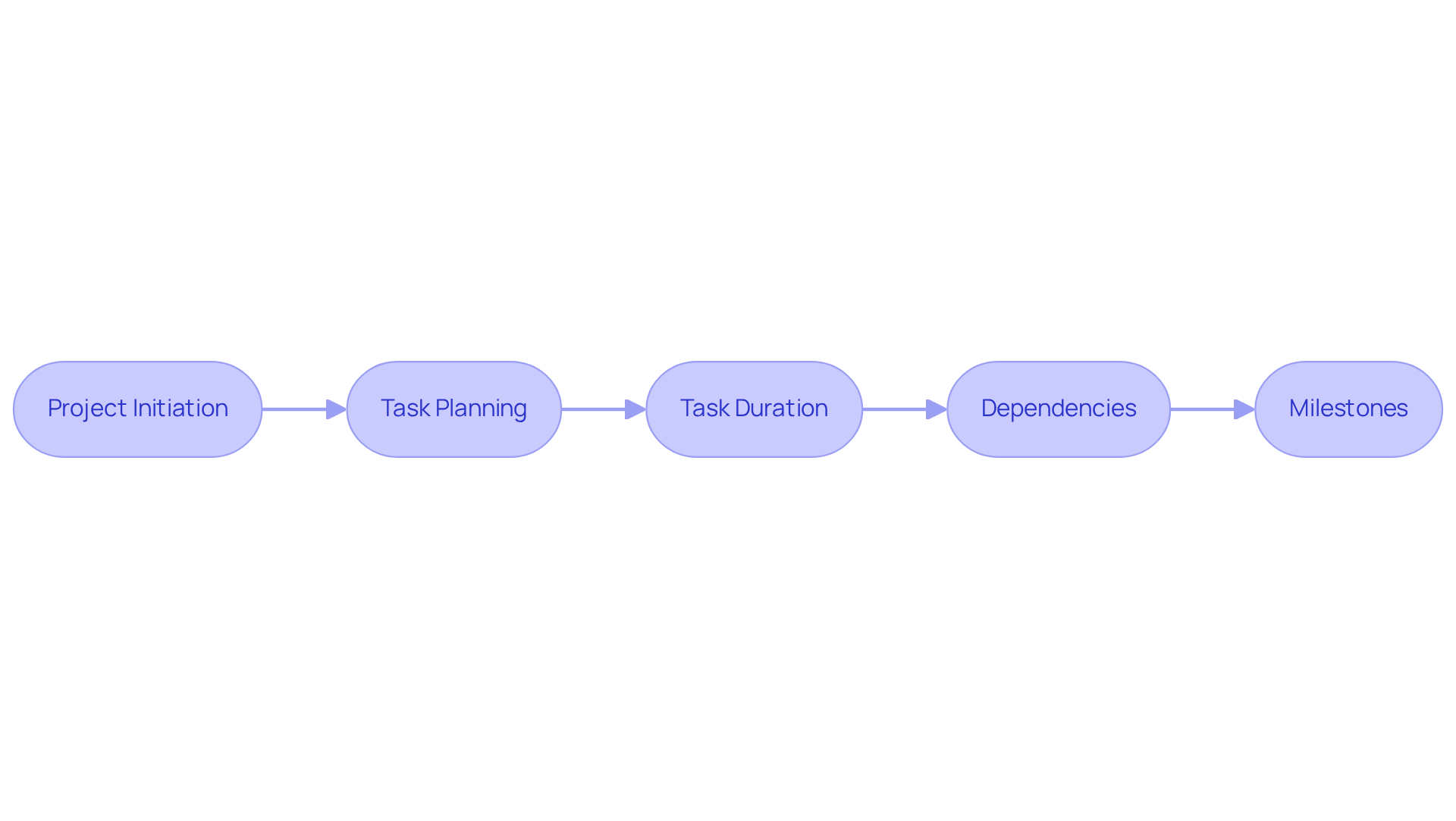
Kanban: Streamline Workflow Management
Kanban is a powerful visual workflow management approach that employs project management techniques to empower teams in optimizing their processes by clearly visualizing work in progress. By utilizing project management techniques like Kanban boards, teams can effectively monitor tasks, limit work in progress, and identify bottlenecks within their workflows. This strategic approach employs project management techniques that not only foster continuous improvement but also significantly enhance team collaboration.
For startups, which often face the need to adapt swiftly to fluctuating demands and priorities, Kanban proves to be particularly advantageous.
Are you ready to transform your workflow and elevate your team's performance?
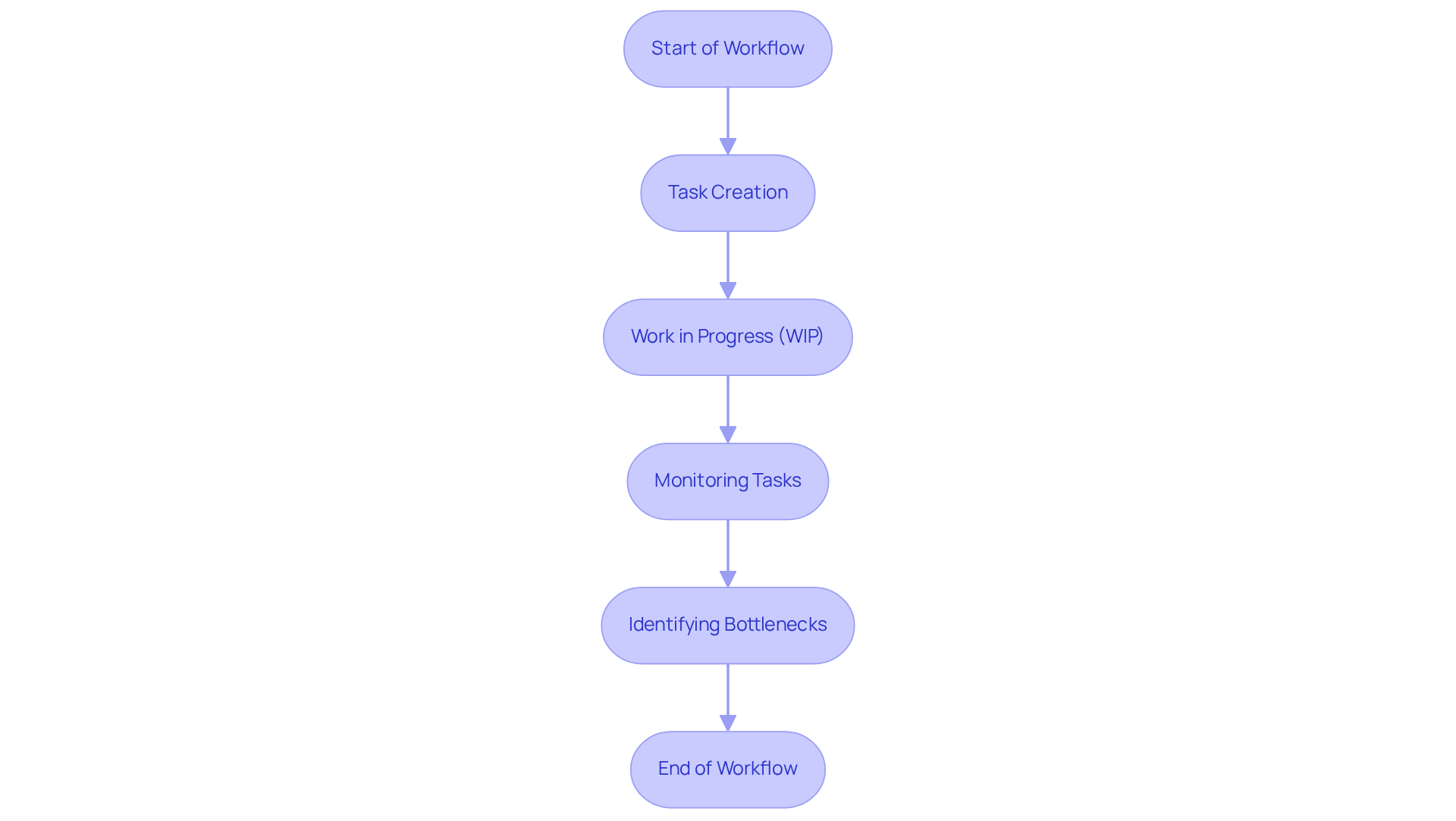
Lean Project Management: Maximize Value and Minimize Waste
Lean methodology serves as a powerful approach that maximizes customer value while minimizing waste. By pinpointing and eliminating non-value-adding activities, startups can effectively streamline their processes and enhance efficiency. This methodology not only encourages continuous improvement but also cultivates a culture of innovation. For startups striving to deliver high-quality products and services with limited resources, lean principles are especially pertinent.
How can your startup leverage these principles to achieve greater efficiency? Consider the potential impact of adopting a lean mindset on your operations.
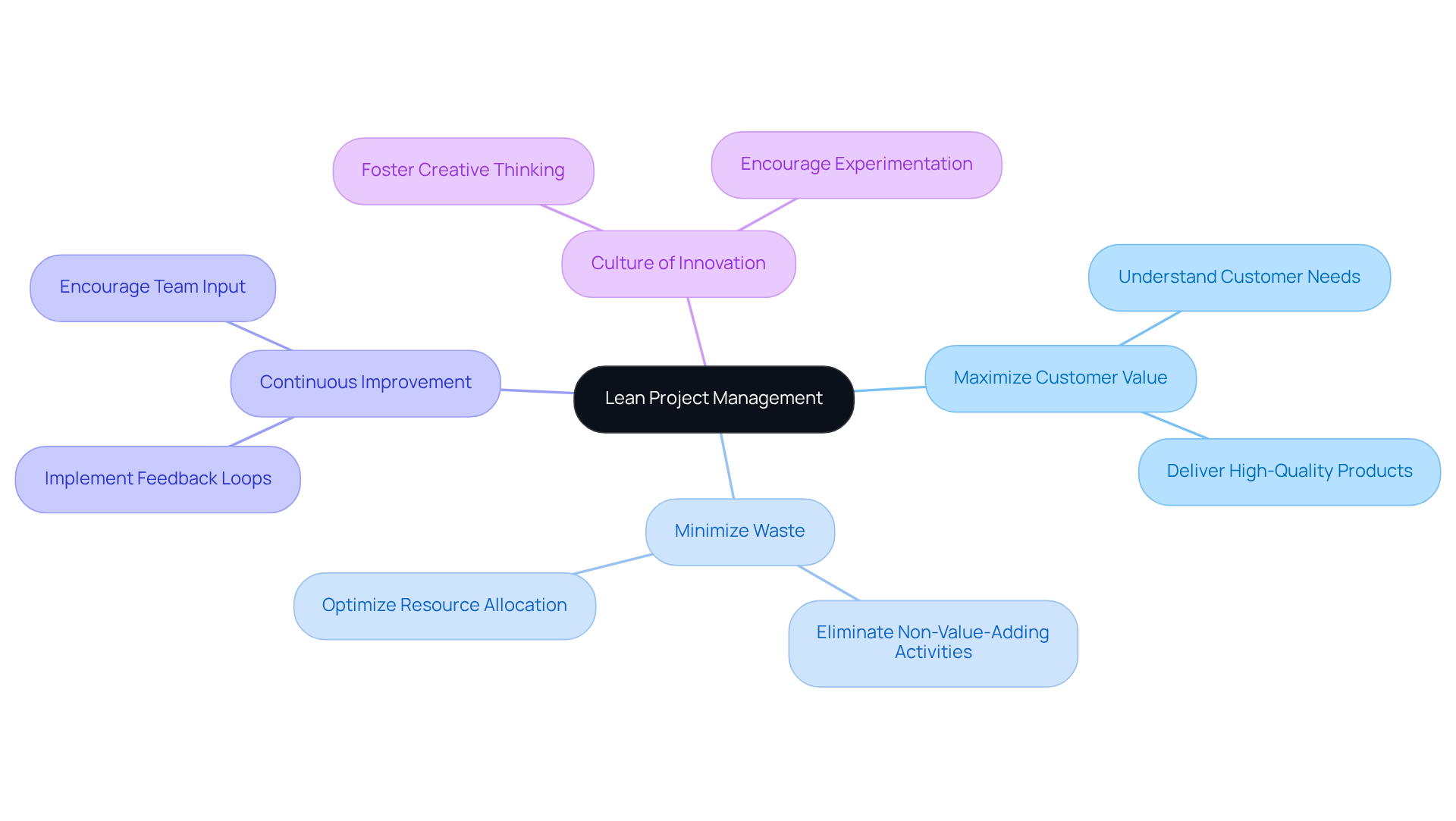
Earned Value Management (EVM): Assess Project Performance
Earned Value Analysis (EVA) is a pivotal technique among project management techniques, seamlessly integrating scope, schedule, and cost to effectively evaluate performance. Originating in 1967 from the U.S. Department of Defense's imperative to manage intricate programs, EVM systematically juxtaposes planned progress with actual performance, empowering startup founders to swiftly pinpoint variances. This early detection of deviations is crucial; studies indicate that 52% of delayed projects face additional costs averaging 189%, underscoring EVM's essential role in mitigating cost overruns.
EVM not only enhances insight into project health but also facilitates proactive management of potential issues, enabling teams to address challenges before they escalate into significant setbacks. The integration of project management techniques like EVM within startup projects has proven beneficial, offering a structured approach to monitoring progress and resource allocation. This methodology empowers founders to maintain control over their initiatives, ensuring adherence to initial time, cost, and scope parameters while fostering a culture of accountability among team members.
As emphasized by the U.S. Government Accountability Office, project management techniques such as Earned Value Management (EVM) are widely recognized as best practices for performance measurement in projects, enabling informed decision-making and early identification of risks. Are you ready to leverage this powerful tool to enhance your project's success?
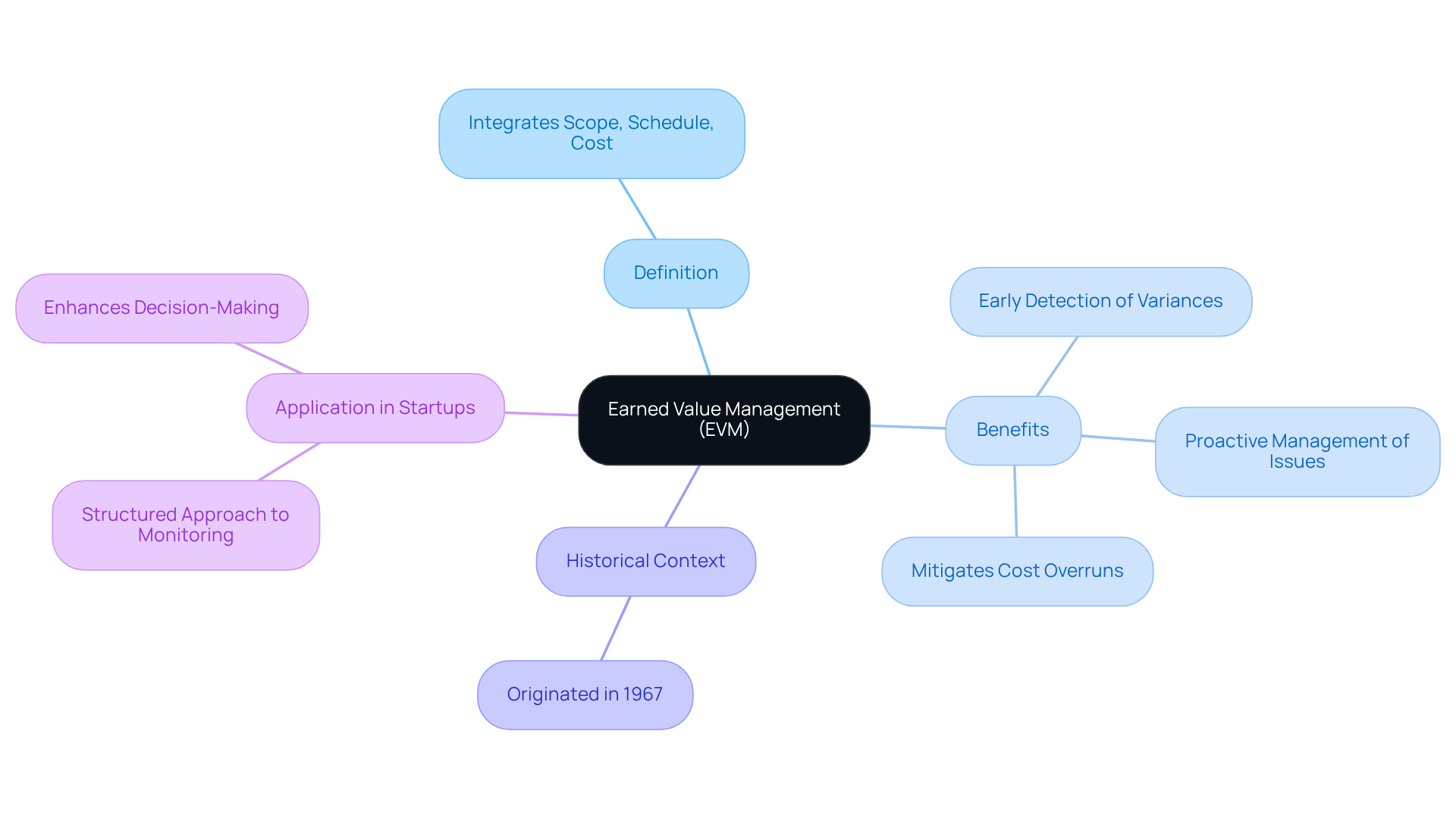
Risk Management: Proactively Address Project Risks
Risk oversight is crucial for recognizing, evaluating, and addressing potential threats that could impede success. For startup founders, proactively tackling these risks is not just advisable; it is essential for minimizing disruptions and ensuring smooth execution. By developing a comprehensive risk control plan, teams can anticipate challenges, implement effective mitigation strategies, and maintain momentum. This proactive approach ultimately leads to increased success rates.
Consider this: What risks could be lurking in your startup's path? A thorough risk assessment can illuminate potential pitfalls and empower you to navigate them effectively. With the right strategies in place, you can transform uncertainty into opportunity, ensuring your venture thrives in an ever-changing landscape.
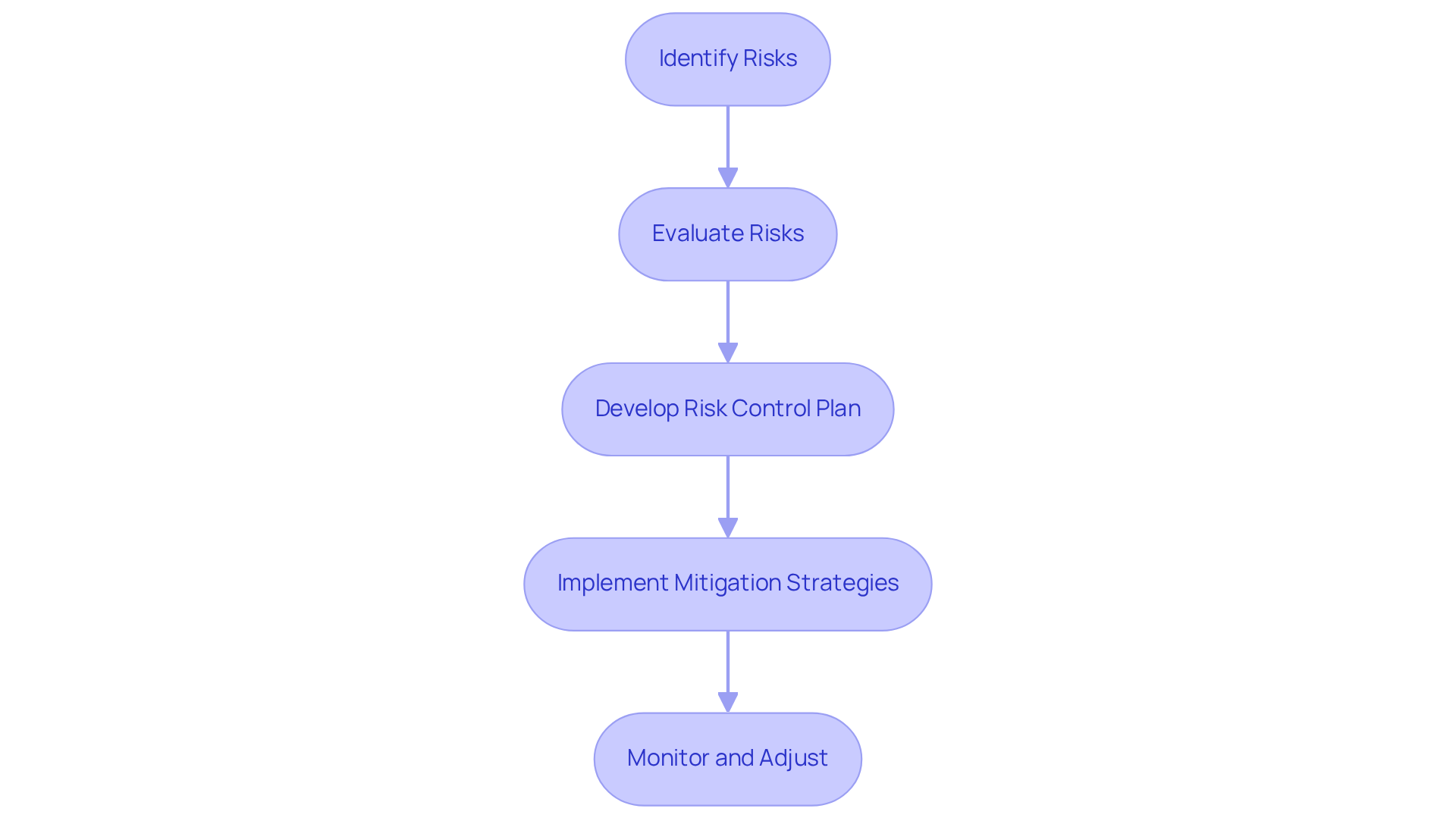
Agile Methodology: Embrace Flexibility and Customer Feedback
Agile methodology stands as a dynamic management approach that emphasizes flexibility, collaboration, and iterative development. By breaking down assignments into smaller cycles known as sprints, teams can swiftly adapt to evolving requirements and effectively incorporate customer feedback throughout the development process. This iterative nature fosters a culture of continuous improvement, ensuring that products align closely with customer needs. As Jeff Sutherland aptly states, "Focus on delivering valuable outcomes rather than an exhaustive list of tasks," underscoring the effectiveness of Agile practices in enhancing results.
Statistics reveal a staggering 85% of effort is wasted in organizations, with only 1/6 of work generating value. This highlights the critical role Agile plays in maximizing productivity. For startup founders who adopt Agile practices, the outcome often translates to increased customer satisfaction and more efficient delivery of value. Furthermore, Agile promotes open communication and transparency, empowering teams to acknowledge mistakes and learn from them—essential for fostering innovation and responsiveness in fast-paced environments.
Real-world examples, such as Casy's automation of project management techniques, illustrate how Agile practices can significantly enhance project outcomes by minimizing manual updates and improving coordination. Are you ready to embrace Agile and transform your approach to project management techniques?
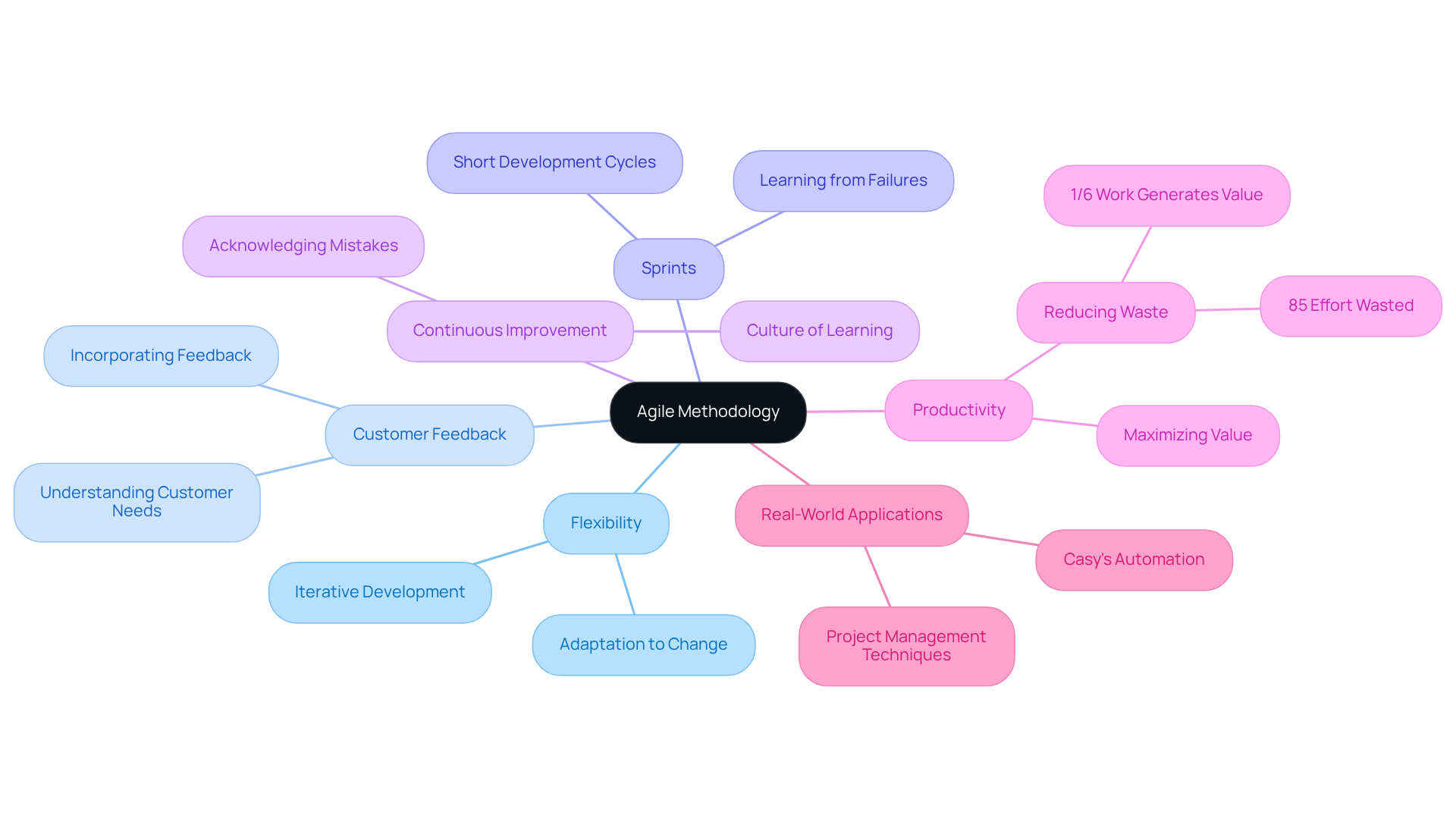
Conclusion
Embracing effective project management techniques is crucial for startup founders aiming to navigate the complexities of their ventures successfully. This article highlights ten essential strategies, including automation with tools like Casy, the Critical Path Method (CPM), Scrum, and Lean methodology. Each of these contributes to enhanced productivity, efficient resource allocation, and improved team collaboration. By implementing these methodologies, startups can streamline their processes, adapt to changing demands, and ultimately drive their projects toward success.
Key insights discussed include the importance of visual tools like Gantt charts and Kanban boards, which aid in task management and workflow optimization. Moreover, risk management and Earned Value Management (EVM) are emphasized as vital techniques for proactively addressing potential challenges and assessing project performance. Each technique offers unique benefits that, when combined, create a robust framework for achieving project goals and fostering a culture of continuous improvement.
In conclusion, the significance of adopting these project management techniques cannot be overstated. By leveraging the right tools and methodologies, startup founders can transform their approach to project execution, ensuring that they not only meet their objectives but also exceed expectations. The call to action is clear: embrace these essential strategies and empower your team to thrive in the ever-evolving landscape of entrepreneurship.
Frequently Asked Questions
What is Casy and how does it enhance productivity?
Casy is an automation tool that functions as an invisible project manager, integrating with chat platforms like Slack and Telegram. It automatically captures key information from discussions, creates assignments, sets deadlines, and updates documents, allowing teams to focus on their core activities and enhancing productivity.
How does Casy categorize assignments?
Casy categorizes assignments into areas such as R&D, Bugs, and In Progress, providing complete visibility for team members regarding their tasks.
What project management techniques does Casy support?
Casy supports project management techniques such as OKRs (Objectives and Key Results) and the Eisenhower Matrix, which help in efficiently prioritizing tasks.
What statistics highlight the benefits of automation in project management?
According to statistics, 85% of business leaders believe that automation enables employees to focus on strategic goals, while 73% of IT leaders report that automation has reduced time spent on manual tasks.
How does the Critical Path Method (CPM) contribute to project management?
The Critical Path Method (CPM) identifies the longest sequence of dependent activities necessary for project completion, helping startup founders enhance timelines, allocate resources effectively, and meet deadlines.
How can Casy complement the Critical Path Method?
Casy complements the CPM by automating the creation of activities and integrating with chat platforms, allowing teams to turn discussions into actionable tasks without manual input, thereby reducing administrative burdens.
What is Scrum and how does it benefit teams?
Scrum is an agile framework that facilitates iterative progress through time-boxed cycles called sprints. It promotes collaboration, accountability, and continuous feedback, which are essential for startups to adapt quickly to changing requirements.
What outcomes can teams expect from adopting Scrum?
By adopting Scrum, teams can improve communication, prioritize activities effectively, deliver incremental enhancements, and ultimately achieve greater customer satisfaction and success.




